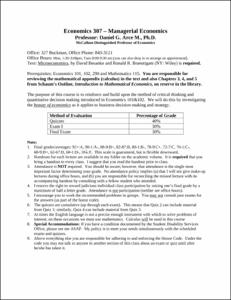Please use this identifier to cite or link to this item:
http://hdl.handle.net/10267/1245Full metadata record
| DC Field | Value | Language |
|---|---|---|
| dc.contributor.author | Arce, Daniel G. | - |
| dc.date.accessioned | 2008-02-28T16:03:23Z | - |
| dc.date.available | 2008-02-28T16:03:23Z | - |
| dc.date.issued | 2008-02-28T16:03:23Z | - |
| dc.identifier.uri | http://hdl.handle.net/10267/1245 | - |
| dc.description | This syllabus was submitted to the Rhodes College Office of Academic Affairs by the course instructor. | en_US |
| dc.description.abstract | This class is about thinking; no questions will be asked that reward memorization. 2. The only excused absences are for officially sanctioned college events. All work for excused absences is to be completed and turned in ahead of time. This includes exams. 3. Microeconomics is a full contact experience. The best way to learn microeconomics is by doing it. I selected this textbook because of the quality of the learning-by-doing problems in the chapters and the problems at the end of each chapter. Periodically, I will entertain questions in class about how to solve past exam questions. Be prepared for such occasions by attempting the recommended problems far in advance. 4. Feel free to ask questions in class. 5. You are also welcome to come to my office hours. Be aware that it is likely that I will ask you as many questions as you ask me. I treat office hours as if they are an extension of class. 6. An Email message distributed to class 36 or more hours prior to an event is considered “fair warning.” Check your Email regularly. 7. If you are absent on the day that a quiz or exam is returned, you may pick it up in my office. 8. I reserve the right to give a “pop” quiz at any point in time. You may not make up a pop quiz. Excused absences are defined in point 2 above. 9. Claims against grading can only be made until the due date of the next graded assignment of any type. I will discuss the material from any evaluation at any time. 10. If I do not cover a topic in class or on the past problems, then I will not be asking about it on exams and quizzes. This class is predominantly lecture- and problem set-driven. 11. If Memphis or Shelby County Public School SYSTEMS are closed due to weather, class is cancelled. 12. This class is about thinking; no questions will be asked that reward memorization. Instructions for working on assigned problems as preparation for quizzes/exams • Work in groups; if you come to my office asking about a problem, I’m going to ask you who is in your group. It is best to come as a group. • All answers (including short answer questions) must include artwork and/or algebra unless explicitly specified. • Correct answers without accompanying (and correct) economic analysis will receive zero credit. • To receive partial credit, you must show your work. • Your answers are required to be concise and self-explanatory. • Keep your creative writing skills on a leash. Learning is achieved not only through doing the past problems but by reflecting on what you have done/learned. Reflecting is about getting the meaning. | en_US |
| dc.language.iso | en_US | en_US |
| dc.publisher | Memphis, Tenn. : Rhodes College | en_US |
| dc.relation.ispartofseries | Syllabi CRN | - |
| dc.relation.ispartofseries | 20235 | - |
| dc.rights | Rhodes College owns the rights to the digital objects in this collection. Objects are made available for educational use only and may not be used for any non-educational or commercial purpose. Approved educational uses include private research and scholarship, teaching, and student projects. For additional information please contact archives@rhodes.edu. Fees may apply. | - |
| dc.subject | Economics, Department of | en_US |
| dc.subject | Syllabus | en_US |
| dc.subject | Text | en_US |
| dc.subject | Curriculum | en_US |
| dc.subject | 2006 Spring | en_US |
| dc.title | ECON 307-01, Managerial Economics, Spring 2006 | en_US |
| dc.type | Syllabus | en_US |
| Appears in Collections: | Course Syllabi | |
Files in This Item:
| File | Description | Size | Format | |
|---|---|---|---|---|
| 2006_spring_ECON_307.pdf | 71.99 kB | Adobe PDF |  View/Open |
Items in DSpace are protected by copyright, with all rights reserved, unless otherwise indicated.